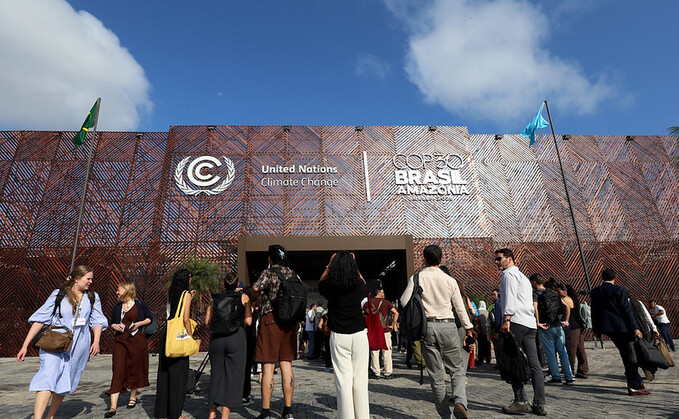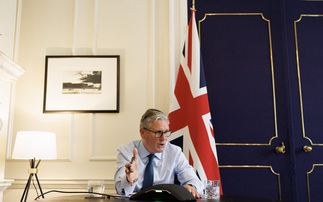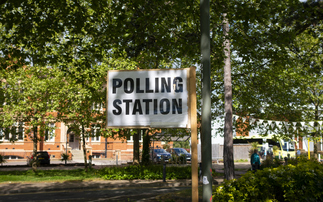
Credit: Aline Massuca/COP30
After a gruelling two weeks in Brazil, top experts and COP veterans came together to explore what businesses can take from the summit in BusinessGreen's latest webinar, hosted in partnership with Inspired
With the gavel having come down on the COP30 Summit in Brazil at the weekend, the dust is starting to settle following what was - even by the standards of COPs past - a pretty dramatic and gruelling fortnight of UN climate negotiations in Brazil.
Taking place on the edge of the Amazon in the port city of Belém, preparations for the event were hit by logistical challenges, with the high cost and limited availability of accommodation being among the most prominent. And then, once the event got underway, the summit venue struggled to cope with tropical downpours before it then had to be evacuated on not one but two separate occasions: first after a group of around 150 protestors broke in carrying placards proclaiming 'our forests are not for sale', and second after a sizeable fire broke out just as the negotiations were entering their crunch final hours.
The metaphors wrote themselves, as diplomats and delegates from around the world were forced to contend with tropical heat, hard rain, sleepless nights, and in some cases makeshift riverboat accommodation that all added up to an immersive climate experience.
These challenges were exacerbated by a volatile geopolitical backdrop marred by war and trade disputes and the usual deep divisions on matters ranging from climate finance to the future of fossil fuels. But Brazil's COP30 Presidency still managed to herd the proverbial cats into a consensus around an agreement that has sparked both optimism and disappointment in near equal measure.
Many of the headlines were dominated by way a group of around 90 nations pushed for the final agreement to include a commitment to creating a roadmap to transition away from coal, oil and gas worldwide, only to see that effort blocked by an alliance of petrostates with the final text failing to even mention 'fossil fuels'. That failure prompted around two dozen countries - backed by Brazil's COP30 Presidency - to throw their weight behind plans led by Colombia to hold a separate global summit in April next year to drive forward the proposed roadmap and ensure the topic features once again at next year's COP31 talks in Turkey.
Disputes over trade policy also came to the fore in the talks, as demonstrated by a final agreement that highlighted emerging economies' opposition to carbon border levies that are set to come into effect in the EU and UK in the next year or so. Expect that issue to also run and run at future climate talks.
Meanwhile, there were some positive progress on issues such as climate adaptation, for which a target has been agreed to triple funding through to 2035, backed by a new two-year work programme to explore how to ramp up flows of climate finance to developing countries.
Moreover, the final agreement reaffirmed the supremacy of climate science, extolled the importance of delivering a fair and just transition to a low carbon economy, underscored the importance of tackling deforestation and welcomed the progress of clean technologies.
All that came in addition to pledges worth billions of dollars for an innovative new tropical forest conservation fund, and many tens if not hundreds of billions more for a raft of real-economy initiatives and deals delivered via the summit's Action Agenda.
So, what to make of such a mixed bag of outcomes? And can COP30 - the first climate summit to take place in a tropical rainforest region - be considered a success, a failure, a missed opportunity, or all of the above?
To explore the outcomes and potential conclusions from the COP30 summit, BusinessGreen yesterday hosted a webinar in partnership with ESG consulting, reporting, and advisory services firm Inspired.
The online event - Spotlight on Climate Diplomacy: What your business needs to know about the COP30 Climate Summit - brought together several top experts fresh from a busy two weeks in Belém to discuss what the business community can learn from one of the most dramatic climate summits of recent years.
The shifting sands of geopolitics and climate diplomacy
For COP veteran Ed King, Belém was "the most intense climate summit I've ever been involved with", yet it ultimately revealed a determination among all nations present to keep the multilateral climate talks moving forward.
"It was exceptionally hot. We had floods. We had rains. We had a fire that many people may have seen," King said during the webinar. "But I think the most important thing for folks to take on board is that we do have 194 countries that are still committed to kicking this on and remain committed to climate progress."
King, who previously covered COPs as a journalist before moving to the Global Strategic Communications Council (GSCC) - a philanthropically-funded network of climate comms professionals where he now works as network director for energy and diplomacy - has been a close observer of the UN negotiations for well over a decade, and he is convinced the geopolitics underpinning the long-running talks have fundamentally shifted in recent years.
"I think we have to now recognise, based on what we learned in Belém, that we are in a fundamentally different word," he explained. "And that is a world where emerging economies are now setting the rules and agenda and kicking on, and it is not the European Union nor other Western nations - which have typically regarded themselves as the agenda-setters and the leaders - who will be doing that. Moving forward, it's going to be China, it's going to be India, it's going to be these other countries which have huge economic power, huge diplomatic power, and do not like being told how to run their economies and how to manage the transition."
That much was clear in the fierce opposition from a group of around 30 countries - largely dominated by Saudi Arabia, Russia, and Gulf petrostates - to the proposal for a global roadmap away from fossil fuels, according to King.
"I would say, while there was clearly pushback from them - and there was clearly pushback regarding these roadmaps that we saw - it's more nuanced than them simply saying 'we do not want to talk about fossil fuels'," he explained. "They just do not want to be told how to manage their development pathways and their transition - and they especially don't want to be told how to do that by European countries and the UK and others.
"[In the absence of the US] there is also no big economy to sort of try and push them in that direction. So, it's going to require a fundamental shift in how we view diplomacy, and how diplomacy operates."
But despite these challenges, COP30 again underscored how a large majority of countries is in favour of climate action, including some of the world's biggest and influential economies, King added. "In July, India ran half of its power grid on clean energy, and it's investing fast in renewables," he explained. "China is the world's biggest clean tech factory. Saudi Arabia is massively hiking its solar imports so it can replace its oil power grid with solar panels. So we are seeing these shifts everywhere we look. The question is not whether the transition is happening - it's whether it's happening fast enough."
Are 'coalitions of the willing' now the way forward?
If the vast majority of national climate plans and targets for 2035 are anything to go by, the transition certainly is not happening fast enough. While all parties to the Paris Agreement were urged to present updated, more ambitious national climate action plans - or Nationally Determined Contributions (NDCs) in the UN jargon - ahead of COP30, only around 70 honoured the UN deadline, and a fair number of these plans were not nearly sufficient to put economies on a pathway to net zero by mid century that would limit temperature increases to 1.5C this century.
Also speaking during the webinar was María Mendiluce, CEO of the corporate climate action non-profit the We Mean Business (WMB) Coalition, who has also observed many COPs during a more than 25-year career in sustainable development, clean energy, and climate action. For her, and many other business figures, the lack of more ambitious NDCs was a disappointment, as was the failure to secure a firmer commitment to new roadmaps on fossil fuels and deforestation and the lack of focus throughout the talks on the need to shift subsidies away from fossil fuels.
Mendiluce argued COP30 once again showed how the green economy is moving ahead of the policy landscape, which has a huge amount of catching up to do if laggards are not going to leave themselves exposed to significant climate and economic risks.
"The real economy is moving faster than the diplomacy and the consensus-driven process - but the market is not driven by consensus, but by the demand," she said. "The real economy is moving forward. I think the countries that are opposing [the proposed roadmaps] might need to reconsider that this is a way of doing it in an orderly way, because the market is going in that direction."
Despite the sometimes sluggish pace of the multilateral climate negotiations at COP summits and the relatively weak texts that tend to result from a consensus based approach, Mendiluce insists the process still has a hugely important role to play. However, she argued it may now be time for climate-action-oriented countries to build 'coalitions of the willing' that can provide the policy clarity and investment frameworks businesses urgently need to accelerate the net zero transition.
"I think that multilateralism still matters, but that we should not see multilateralism as [the need for] 'consensus', but rather as an opportunity to build ‘coalitions of the willing'," she said.
Mendiluce pointed to the commitment from two dozen countries at COP30 to attend a world-first international summit in Colombia next April focused on how to deliver the global transition away from fossil fuels is a "clear example" of how emerging coalitions of the willing are working to accelerate decarbonisation efforts.
"I think we should not forget that businesses can do a lot and will invest a lot, but policies can go a long way towards accelerating action," she said. "And so the NDCs and the policies that go behind them are very important."
Climate adaptation and resilience
Dr Michelle de Jongh, managing director for ESG at Inspire, echoed Mendiluce's disappointment at the lack of clarity provided by COP30 over the pathway forward for the private sector in a range of areas, most obviously demonstrated by the failure to secure consensus on the development of a fossil fuel transition roadmap. "There is a need for clear guidance on the way forward," she said. "It does cause uncertainty in the business community and how that's then going to filter down into local policy and then into different sectors."
More positively, however, de Jongh welcomed the stronger focus in this year's negotiations on climate adaptation, which has long taken a back seat in the annual talks to discussions on how to reduce emissions and ramp up climate financing.
The commitment to increase climate adaptation funding should filter through into a greater focus on how businesses and supply chains can invest in resilience measures, such as flood defences, insulation, and sustainable farming practices, according to de Jongh, who expects climate adaptation to increasingly feature in corporate reporting requirements.
"Over the last couple of years a lot of businesses have already been reporting - in line with requirements - their exposure to the physical and transition risks of climate change," she said. "But we're going to see more pressure on business resilience and adaptation, and with the adaptation metrics that have been discussed at COP30, we will see that being filtering through the UK's existing disclosure requirements and more focus on them."
That, in turn, could unlock much-needed new investment in climate adaptation and resilience efforts from businesses. But to enable that to happen, de Jongh stressed the need for widespread alignment on disclosure expectations and requirements in different jurisdictions and regions around the world, so as to reduce complexity for supply chains and multinational companies.
"The focus on better, more granular reporting is really going to start driving that conversation in companies of the need to put 'X' amount aside in their budgets to support how they are going to implement these solutions, while also enforcing a longer-term view," she explained. "This push for more focus on adaptation resilience, giving more weight to the existing disclosure requirements and on whether we're going to see new adaptation indicators - we could actually start seeing how companies are going to be budgeting for those solutions and what steps they're taking to implement those."
Adaptation and resilience are bedfellows of climate and nature risk assessing and disclosure, according to de Jongh, and this year's agreement should feed through into greater pressure on companies to get a better handle on the threats they and their supply chains face as the world both warms and decarbonises.
To that end, while COP30 failed to deliver the desired clarity over the future for fossil fuels worldwide, it was arguably clearer than ever on the broad direction of the transition the global economy is already embarked upon. Although it generated few headlines over the weekend, the final text agreed at COP30 saw 194 parties for the first time state that "the global transition to low greenhouse gas emissions and climate-resilience is irreversible and the trend of the future".
After Belém, precisely what shape future UN climate negotiations will take going forward, and how the multilateral process interacts with wider geopolitics, remains to be seen. But as Mendiluce was at pains to stress, there was one message that rang louder and clearer than ever at COP30.
"I think there was a very clear signal from many countries that the transition is inevitable," she said. "There is a lot of noise, but actually the market is going to that direction, and countries are going in that direction. I think countries need to hear more from business that they want to go into this direction."
BusinessGreen's webinar - Spotlight on Climate Diplomacy: What your business needs to know about the COP30 Climate Summit - was hosted in partnership with Inspired. It can be watched back on demand here.










